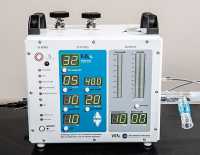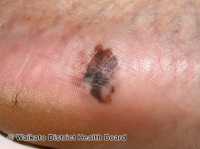Atopic Dermatitis – Eczema: Jakafi® (ruxolitinib) Found to Reduce Itch and Improve Quality of Life
KRAS Mutant Cancers: Phase I study RAF-MEK inhibitor and FAK inhibitor defactinib in an intermittent dosing schedule
 Peter Jüni, MD, FESC
Director, Applied Health Research Centre
Li Ka Shing Knowledge Institute of St Michael's Hospital
Department of Medicine
University of Toronto, Ontario
MedicalResearch.com: What is the background for this study?
Response: It is unclear whether seasonal changes, school closures or other public health interventions will result in a slowdown of the current coronavirus disease 2019 (COVID-19) pandemic. We studied 144 geopolitical areas around the world with more than 375,000 COVID-19 cases by March 27 to determine whether epidemic growth is globally associated with climate or public health interventions intended to reduce transmission of severe acute respiratory syndrome coronavirus 2 (SARS-CoV-2).
(more…)
Peter Jüni, MD, FESC
Director, Applied Health Research Centre
Li Ka Shing Knowledge Institute of St Michael's Hospital
Department of Medicine
University of Toronto, Ontario
MedicalResearch.com: What is the background for this study?
Response: It is unclear whether seasonal changes, school closures or other public health interventions will result in a slowdown of the current coronavirus disease 2019 (COVID-19) pandemic. We studied 144 geopolitical areas around the world with more than 375,000 COVID-19 cases by March 27 to determine whether epidemic growth is globally associated with climate or public health interventions intended to reduce transmission of severe acute respiratory syndrome coronavirus 2 (SARS-CoV-2).
(more…)Personalized Medicine: Caris Life Sciences Offers DNA and RNA Cancer Profiling
Migraine: Yoga May Be Useful Addition to Medical Therapy
Lung Cancer: Genetic Variant Identifies Increased Risk in Subset of Non-Smoking Women
A subset of individuals of Ashkenazi Jewish descent was found to carry a variant of ATM that occurs fairly frequently...
COVID Pandemic: Number of Patients Seeking Stroke Care Plummets
VITRAKVI® (larotrectinib): Outcomes by Prior Treatment & Performance Status in TRK Fusion Cancer Patients
VITRAKVI® (larotrectinib) in Patients with Cancer and NTRK Gene Fusions
MGH Study Finds Majority of COVID-19 Patients on Ventilators Do Not Die
Repurposed Rheumatology Drug May Reduce Inflammation in COVID-19 Infection
Early Breast Cancer: 21-Gene Recurrence Scores Can Help Guide Chemotherapy Prognosis
Sepsis With Anaerobic Bacteria Linked to Increased Colon Cancer Risk
COVID-19: Estimating The Infection Fatality Rate Among Symptomatic US Patients
Racial and Ethnic Disparities in Melanoma Awareness
Yes to Performance and No to Doping: Is Hemp Extract Legal in Sports?
Hemp-derived cannabidiol (CBD), or hemp extract, has been gaining in popularity in recent years. As long as CBD extract is produced using hemp plants, not marijuana, and contains less than 0.3% THC, it's considered legal in all 50 states. Some states enforce restrictions on buyers, but federally, general consumers who want to use CBD are in the clear.
Unfortunately, while the social stigma surrounding hemp extract has largely been eradicated in general populations, the athletic community hasn't fully embraced the benefits of CBD and some competitive fields still have strict regulations in place governing its use. Read on to find out what amateur, college, and professional athletes need to know.
CBD for Amateur Athletes
Amateur athletes don't have to worry about the restrictions put in place by regulatory bodies. They are free to take advantage of CBD's non-psychoactive therapeutic benefits, which include reduced joint pain and inflammation and improved muscle recovery after strenuous workouts. Guardian Athletic has more information about the benefits of cannabidiol for athletes looking to reduce recovery time and improve performance on their website.
Those who plan to engage in collegiate athletics or try out for semi-pro or professional sports teams should be aware that CBD can show up on a blood test for several days after consumption. They should also note that some hemp extracts contain up to 0.3% THC. This extremely low concentration is unlikely to produce a positive test result for marijuana, but it's still better to buy CBD from a reputable supplier that uses lab testing to ensure 0% THC concentrations.
(more…)FASENRA® – Benralizumab for Adolescent Patients with Severe, Uncontrolled Asthma
Trulance® (plecanatide) For Chronic Idiopathic Constipation and Irritable Bowel Syndrome-C
RNA Profiling Identifies Distinct Classes of White Fat Cells
USPSTF: Recommendations for Prevention and Cessation of Tobacco Use in Children and Adolescents
Cancer Drug Approval: FDA Acceptance of Surrogate End Points
People With More Brown Fat May Burn Fuel More Efficiently
Metastatic Breast Cancer: Tumor Profiling by Liquid Biopsy Can Help Drive Therapy
Asthma Exacerbation Severity Is Greater for Women than for Men


Lifetime Health Care Costs Associated with Systemic Corticosteroid Use in Adults with Persistent Asthma




























